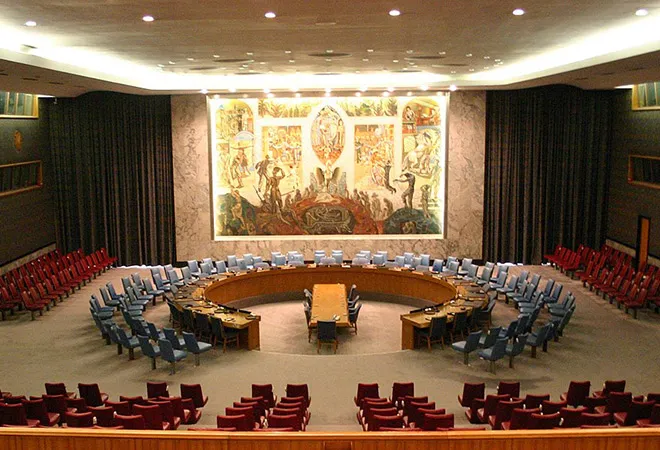-
CENTRES
Progammes & Centres
Location
As the current President of the UN Security Council, India has provided dynamic leadership and direction in envisioning a global roadmap on enhancing maritime security that will go a long way in shaping the contours of emerging world order ----

The UN Security Council Open Debate on “Enhancing Maritime Security: A Case for International Cooperation”, held in August 2021 and presided over by Prime Minister Narendra Modi has been momentous because it is the first time that maritime security was deliberated in a “holistic manner as an exclusive agenda item” in such a high-level global forum. Even if the UN Security Council had discussed and passed resolutions on different aspects of maritime security on earlier occasions, an exclusive focus and statement on such an imperative agenda in a high-level forum reflects the strategic significance of the issue in preserving a much-needed equilibrium that shapes the contours of geostrategic stability in an evolving new world order. In this context, it is argued that India’s leadership as the current President of UNSC in configuring a comprehensive approach for maritime security—at this critical juncture when ocean domains face increasing security concerns and threats—is appropriate and timely. It revitalises the issue in the international community while demonstrating the urgency to effectively address the emerging maritime challenges with a spirit of reformed multilateral cooperation, heightened transparency in governance that further affirms and emboldens the established international law as reflected in the 1982 UN Convention of the Law of the Sea (UNCLOS). Such an assertion is further propelled by India’s unique geographical position marked by its long coastline and the crucial intersection of the the Indian Ocean, the Straits of Malacca, and the volatile Indo-Pacific maritime corridor while connecting the wider Pacific waters. This directly impacts New Delhi’s strategic geopolitical, security, economic, and maritime trade concerns..
It is argued that India’s leadership as the current President of UNSC in configuring a comprehensive approach for maritime security—at this critical juncture when ocean domains face increasing security concerns and threats—is appropriate and timely.
In the contemporary era of global political and economic interdependence, it is a fact that sea routes are increasingly facing safety and security concerns as they are vulnerable to piracy, terrorism, and maritime disputes between many nations. The strategic sensitivities of the Indo-Pacific maritime domain, arising out of geopolitical competition and China’s aggressive behaviour in India’s immediate proximity in conjunction with security threats in the greater Indian Ocean region because of piracy and acts of terrorism, constitute the immediate causes of concern for New Delhi. Additionally, the military contestation in the South China Sea and its ramifications across the wider Pacific are further threats to maritime security. Such continued maritime instability is proving to be unsustainable and poses a grave danger to global sea-trade routes. In this context, New Delhi’s call for a coordinated global roadmap for maintaining a safe and secure maritime domain, essentially marked by enhanced international cooperation and transparency in governance, has been widely acclaimed as timely and appropriate intervention to effectively instate a global maritime equilibrium that is perceived to be a matter of paramount significance in the emerging post COVID-19 world order.
At the UN Security Council Debate, constituting the first standalone discussion on maritime security by the UN’s highest body, India has provided a profound vision and direction to the international community on the issue of maritime security in a robust manner by emphasising climate change and natural disasters as integral components of the maritime domain while ensuring comprehensive preservation and use of shared maritime heritage. Towards this, in the current capacity as the UNSC President, India has proposed five principles that are imperative for ensuring maritime security. Such principles deal with removing barriers from legitimate maritime trade, encouraging responsible maritime connectivity, settling maritime disputes through peaceful means based on international law, jointly facing natural disasters and maritime threats created by non-state actors, and preserving the maritime environment and resources.
The strategic sensitivities of the Indo-Pacific maritime domain, arising out of geopolitical competition and China’s aggressive behaviour in India’s immediate proximity in conjunction with security threats in the greater Indian Ocean region because of piracy and acts of terrorism, constitute the immediate causes of concern for New Delhi.
Removal of barriers to legitimate maritime trade has a strong underpinning in making maritime corridors in global space free and open, thereby, facilitating shared progress. On this, PM Modi highlighted India’s leadership in promoting safe and secure maritime domain when he said,
“In today's context, India has defined the vision of SAGAR (Security and Growth for All in the Region) based on this open and inclusive ethos. Through this vision, we want to create an inclusive structure of maritime security in our region. This vision is of a safe, a secure, and a stable maritime domain. Free maritime trade also requires that we fully respect the rights of each other's sailors.”
On the issue of settling contentious maritime disputes, the Indian PM averred that they “should be resolved peacefully and in accordance with international law,” further adding that this was “extremely important for promoting mutual trust and confidence while ensuring global peace and stability.” Importantly India’s assertion on maritime security, which contained a tacit reference to China’s aggressive actions in the South China Sea, urged the international community for enhancing multilateral cooperation for securing freedom of navigation in accordance with prevailing international laws and in conformity to the 1982 UN Convention of the Law of the Sea (UNCLOS). New Delhi’s endeavour was largely supported by the international community at the UNSC, particularly the United States that observed that the South China Sea and the wider Indo-Pacific was witnessing dangerous encounters and provocative actions to advance unlawful maritime claims that intimidate nations in proximity, undermining the sovereignty of nations in the Indo-Pacific region.
The third principle that New Delhi advocated at UNSC relates to countries jointly tackling maritime threats from non-state actors as well as natural disasters. In this context, India’s leadership role in the vast stretches of the Indian Ocean has been decisive and effective as net security provider. The fourth principle emphasised on the need to conserve maritime environment and marine resources from rampant pollution such as plastic waste and oil spills. India’s fifth principle calls for responsible maritime connectivity through incorporating a viable structure that will accelerate maritime trade in consonance with the development of global norms and standards.
New Delhi’s endeavour was largely supported by the international community at the UNSC, particularly the United States that observed that the South China Sea and the wider Indo-Pacific was witnessing dangerous encounters.
Importantly as the current President of UN Security Council, India’s timely reference towards promoting maritime security is in congruence with its earlier initiatives and exemplary vision on this issue. Towards this, New Delhi’s Indo-Pacific Oceans’ Initiative (IPOI), proposed at the 14th East Asia Summit in Bangkok in November 2019, is considered a landmark intervention in propelling robust international cooperation with a focus on seven pillars of maritime security including maritime ecology; maritime resources; capacity building and resource sharing; disaster risk reduction and management; science, technology and academic cooperation; and trade connectivity and maritime transport. The comprehensive nature of the India-led IPOI while perfectly synergising with the five principles propounded by New Delhi at the UNSC, further makes it a formidable geopolitical construct that has the power and capability to ensure maritime security, shared progress, territorial integrity, and international rules-based system while enabling enhanced maritime connectivity, strategic, and economic cooperation, and sustainable infrastructure development in the volatile Indo-Pacific corridor, thereby, setting a robust roadmap envisaging the much-needed power balance and geostrategic equilibrium in the greater Indian Ocean Region and beyond.
Moreover, India’s advocacy for enhancing maritime security at the UN’s highest-level forum is in sync with its strategic engagement towards promoting multilateral cooperation in establishing stability, maritime security, and territorial integrity in the crucial Indo-Pacific. This is manifested by its pivotal role in QUAD architecture—an exclusive grouping comprising India, the US, Japan, and Australia—while facilitating a robust military collaboration in conjunction with identifying new vistas of strategic cooperation in areas related to maritime connectivity, maritime security, and trade with an objective of ensuring a free, open, and inclusive Indo-Pacific maritime domain marked by territorial integrity and shared prosperity, that by extension includes the wider Indian Ocean and the Pacific Ocean frontiers as well. Furthermore, India’s persistent and decisive interventions in bolstering geostrategic cooperation in the crucial Indian Ocean Rim Association (IORA) further propels New Delhi’s potential as a formidable first responder in providing security in the greater Indian Ocean Region that links Asia, Africa, and beyond. Simultaneously, India's White Shipping Information Fusion Centre in conjunction with the training provided in Hydrographic Survey Support and Maritime Security to many countries has been landmark initiative in increasing shared maritime domain in regional and global dimensions.
Such credible interventions effectively demonstrate India’s commitment, statesmanship, and capability in steering global efforts towards enhancement of global maritime security. Prime Minister Modi’s remarks, while presiding over UNSC High-Level Open Debate, rightfully showcases India’s strong determination and resolve to play a leading role in envisioning a global roadmap towards configuring a robust construct on maritime security that would protect and support legitimate maritime activities while countering traditional and non-traditional threats in the maritime domain.
The views expressed above belong to the author(s). ORF research and analyses now available on Telegram! Click here to access our curated content — blogs, longforms and interviews.

Debasis Bhattacharya is currently working as Professor at Amity Business School Amity University Gurugram. He is also Managing Editor of the Centre for BRICS Studies ...
Read More +